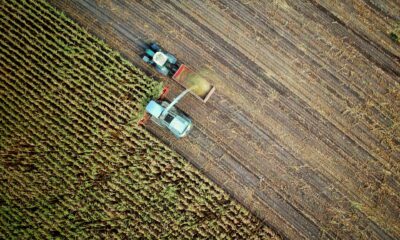Africa
West Africa’s largest organic cotton processing plant inaugurated in Koudougou
West Africa’s first organic cotton plant is up and running in Burkina Faso in an ambitious project designed to boost the country’s organic cotton industry. The $12 million facilities, designed to process 125 tonnes of cotton per day, will be operated by the Organic Cotton Ginning Company (SECOBIO), a joint venture which is 51% funded by the National Union of Cotton Producers of Burkina.

On Thursday, January 30th, 2020, the President of Faso, Roch Marc Christian Kaboré, opened the second edition of the International Cotton and Textile Fair (SICOT), a biennial event that promotes the processing of cotton and textiles from Burkina Faso. The inauguration of the Organic Cotton Ginning Company (SECOBIO), followed the ceremony, which was sponsored by Akinwumi Adesina, General Director of the African Development Bank (AfDB). The Republic of Turkey was the guest of honor during this SICOT.
“Cotton production and processing: engines of industrialization and economic growth for the African States.” It is under this theme that the second edition of the “International Cotton and Textile Exhibition” (SICOT) was held on January 30th and 31st, 2020, in the city of the Red Rider. A platform for exchange and reflection, it brought together professionals from all-cotton chains to work around the concerns and development opportunities of the cotton and textile sector.
Among the events of this publication are the first conference, panel discussions, and round tables, to discuss issues related to the theme of the publication, business meetings, exhibitions of products, and services related to the cotton value chain. The so-called SICOT nights, as well as many other socio-cultural events dedicated to aspects of the cotton value chain.
For the latest economic news, international news, and business stories from an African perspective, see our Born2Invest app to stay up to date.
Major innovations
The president of the National Organizing Committee, Aboubacar Traoré, notes that the major innovations of this edition were the development of a web platform for the registration of participants and the making of appointments for business meetings (B2B and B2G) and also the extension of the duration of the exhibition-sale at the place of the Nation of Koudougou. On the web platform, 1690 participants from 25 different countries have registered and 810 business meetings have been scheduled, as of January 30th, 2020. There were, he adds, over 46 professional exhibitors and 60 exhibitors from the general public.
The representative of Turkey, the country that was marked a guest of honor at this second SICOT, announced the establishment of an integrated cotton processing complex by the AYKA Textile & Investment Group, at a cost of more than $336 million (CFA200 billion). “This giant of the Turkish textile world, will settle in Ouagadougou, Bobo-Dioulasso and here in Koudougou and will generate more than 12 000 direct jobs and 50 000 indirect jobs,” he said.
He hoped that this edition would be an opportunity to consolidate the commitment made in September 2018, by all African and Burkinabe cotton stakeholders, to change the paradigm, and henceforth take the path of transformation through better control of the various cotton value chains.
Exhibitions at the second SICOT
Commercial banks, transport and logistics companies (such as the Bolloré group), and insurance companies working in cotton processing, were all present in the SICOT showroom which was specially reserved for professional exhibitors. Most of the companies that visited said they came for business meetings, partnerships to be woven, and advertising of their products.
This was the case for FASO-B, who specialize in the manufacture of hydrophilic cotton for hygienic and dermatological care. The only drawback was the lack of technical specialists at the exposition level who could explain the approximate financial benefits expected from their participation in this SICOT.
The Organic Cotton Ginning Company (SECOBIO) inaugurated at this edition
After the opening of the second edition of the International Cotton and Textile Fair (SICOT) in Koudougou, the President of Faso inaugurated the organic cotton ginning company (SECOBIO). It was carried out by the consortium National Union of Cotton Producers of Burkina (UNPCB) and the Burkinabe Company of Textile Fibres (SOFITEX), with the partnership of the American NGO Catholic relief services (CRS).
A public limited company with a share capital of $16,830 (CFA10 million), for the needs of project management and whose shareholders are UNCPB (51.02%) and SOFITEX (48.98%). The Managing Director of SOFITEX, Wilfrid Yaméogo, added that the infrastructures are deployed on one hectare with a built area of 5000 m2, i.e. ½ hectare with a total investment cost of $6,5 million (CFA3,8 billion). The ginning capacity of the factory is 17500 tons of seed cotton per season, which is to say 125 tons of cotton to be ginned per day.
Trade Minister Harouna Kaboré added that the construction phase of the plant has created more than 200 jobs. The operational phase will create 40 permanent jobs, 100 seasonal workers, 200-day laborers and more than 500 indirect jobs, including restaurant owners, shopkeepers, and transporters.
The President of Faso indicated that the project is in line with the desire to boost sectors that are promising for the economy and employment. For the reopening of the former Faso Fani textile factory, which in the meantime has become FASOTEX, he said that the State has respected all its commitments and only the final adjustment remains to complete this dossier by March 2020.
For him, it is the commitment he made at the first edition of SICOT in 2018, to ensure that Koudougou regains its former luster, through the establishment of a flourishing and job-creating textile factory, which is about to be put into practice. He acknowledges that the low rate of cotton processing in African countries drastically limits the prospects for economic growth and job creation that can be induced by this sector.
__
(Featured image by Mel Poole via Unsplash)
DISCLAIMER: This article was written by a third party contributor and does not reflect the opinion of Born2Invest, its management, staff or its associates. Please review our disclaimer for more information.
This article may include forward-looking statements. These forward-looking statements generally are identified by the words “believe,” “project,” “estimate,” “become,” “plan,” “will,” and similar expressions. These forward-looking statements involve known and unknown risks as well as uncertainties, including those discussed in the following cautionary statements and elsewhere in this article and on this site. Although the Company may believe that its expectations are based on reasonable assumptions, the actual results that the Company may achieve may differ materially from any forward-looking statements, which reflect the opinions of the management of the Company only as of the date hereof. Additionally, please make sure to read these important disclosures.
First published in lefaso.net, a third-party contributor translated and adapted the article from the original. In case of discrepancy, the original will prevail.
Although we made reasonable efforts to provide accurate translations, some parts may be incorrect. Born2Invest assumes no responsibility for errors, omissions or ambiguities in the translations provided on this website. Any person or entity relying on translated content does so at their own risk. Born2Invest is not responsible for losses caused by such reliance on the accuracy or reliability of translated information. If you wish to report an error or inaccuracy in the translation, we encourage you to contact us.

-

 Fintech1 week ago
Fintech1 week agoRuvo Raises $4.6M to Power Crypto-Pix Remittances Between Brazil and the U.S.
-

 Biotech6 days ago
Biotech6 days agoEurope’s Biopharma at a Crossroads: Urgent Reforms Needed to Restore Global Competitiveness
-

 Crowdfunding2 weeks ago
Crowdfunding2 weeks agoAWOL Vision’s Aetherion Projectors Raise Millions on Kickstarter
-

 Africa2 days ago
Africa2 days agoFrance and Morocco Sign Agreements to Boost Business Mobility and Investment

























